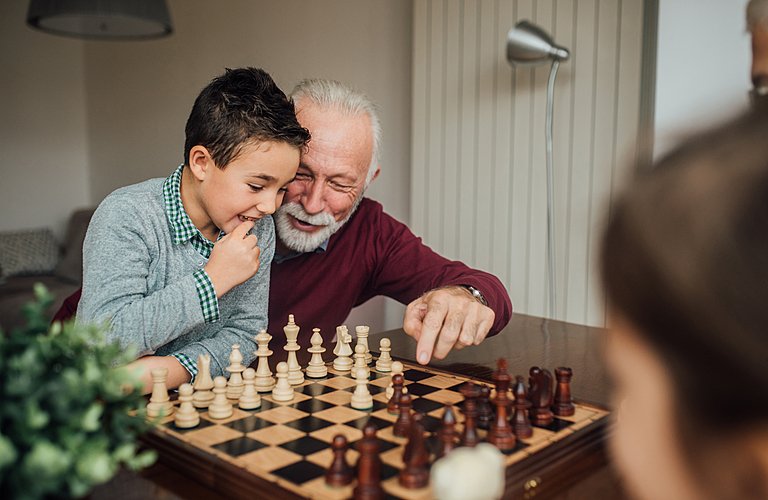192 Sloane Street, London SW1X 9QX

What Is Intergenerational Care in Care Homes?
Intergenerational care in care homes is becoming more and more popular. It helps encourage social interaction and forge connections between different age groups.
In addition, intergenerational activities have been shown to improve older adults’ health and general wellbeing. At KYN, our residents take part in intergenerational programs as part of a varied schedule of enriching activities.
In this guide, we’ll explain what intergenerational care involves and the advantages it can bring. We’ll also discuss how to find care homes with intergenerational programs near you.
Intergenerational Care: Definition
Intergenerational care, or intergenerationality, refers to planned social interactions that bring together people of different generations.
In a care home setting, this usually involves visits from young children from local schools or nurseries. Residents spend time talking, playing and taking part in activities with the children.
The aim of intergenerational care is to bridge a gap between the generations and encourage social relationships. It also aims to help older adults feel engaged and connected with their local community.
What Types of Intergenerational Programs Are There?
There are many different types of intergenerational programs. Depending on the care home, residents and children may share experiences such as:
- Arts and crafts
- Reading
- Reminiscing and telling stories
- Singing and dancing
- Imaginative play
- Gardening
- Cooking
- Going on walks or outings
These activities provide valuable opportunities for both generations to interact, form emotional bonds and learn from each other.
What Are the Benefits of Intergenerational Programs in Care Homes?
A wealth of intergenerational care research has shown that there are advantages for all ages when different generations interact. For older adults in care homes, the benefits of intergenerational practice can be split into three categories: emotional, physical and cognitive.
Emotional Benefits
Intergenerational care has been shown to significantly improve mental health and emotional wellbeing. Older adults in care homes who participate in intergenerational activities may benefit from:
- Reduced feelings of loneliness and isolation
- Lower rates of depression and anxiety
- A more positive self-image
- An improved sense of purpose
- Increased dignity
- A better outlook on ageing
- Feeling hopeful about the future
A study in Ageing & Mental Health found that intergenerational work also provides care home residents with a sense of meaningfulness. This is associated with an improvement in mood, and a feeling of having more control in their lives.
Physical Health Benefits
Older adults also benefit from improved physical health when taking part in intergenerational activities. Compared to their peers, care home residents who regularly interact with children may:
- Be more physically active
- Enjoy an increase in mobility and flexibility
- Experience fewer falls
- Rely less on using a cane
Adults taking part in intergenerational practice burn an average of 20% more calories per week. This increase in physical activity is associated with a longer lifespan, with less risk of developing health problems.
Cognitive Benefits
Research suggests that intergenerational programs may also sharpen the mind. Some older adults who take part perform better on memory tests than those who do not. Those with cognitive impairments (e.g. dementia) experience more improvements while interacting with children than when engaged in other activities.
Playing and engaging with children also creates the opportunity to learn new skills and remember old ones. For example: knitting, playing a musical instrument and playing computer games. A report by NHS Health Scotland found that staying mentally active is important for maintaining overall health and wellbeing.
Intergenerational Program Benefits for Children
Children also benefit from forming social connections with older adults. Studies have shown that intergenerational work improves children's vocabulary, confidence, pro-social behaviour and communication skills. It has also been linked with a lower likelihood of juvenile delinquency later in life.
Intergenerational work benefits society as a whole by breaking down barriers between the generations and promoting social cohesion. When different age groups mix, children and teenagers experience an increase in empathy for older generations. This results in a reduction in ageism and more favourable impressions of older adults.
How Can I Find Intergenerational Programs Near Me?
If you are interested in intergenerational care (UK), you can search online to find programs in your area. You can also contact local care homes directly to enquire about any intergenerational work.
There are even some intergenerational care homes, though these are rare. An intergenerational care home is a mixed age setting where a nursery is set up within a residence for older adults.
A good resource for finding local care homes is the Care Quality Commission (the independent regulator for health and social care). You can use their website to search for care homes in your area and view their ratings.
If you are based in London or the South East, KYN care homes offer bespoke residential and nursing care. We regularly schedule intergenerational programs and many other meaningful activities to enrich our residents' lives.
Discover KYN Luxury Care Homes
KYN homes offer the highest standards of residential, nursing, dementia and respite care. We pride ourselves on our individualised approach to care, working with residents' physical, mental and emotional needs.
KYN residents benefit from a variety of cultural, social and intellectual pursuits alongside outstanding hospitality and facilities. As part of our intergenerational program, residents enjoy storytelling and play with visiting children from local nurseries.
To discover more about KYN luxury care homes, contact us today to request a brochure or visit. Fill in our form, call +44 (0) 20 3535 1923 or email enquiries@kyn.co.uk.